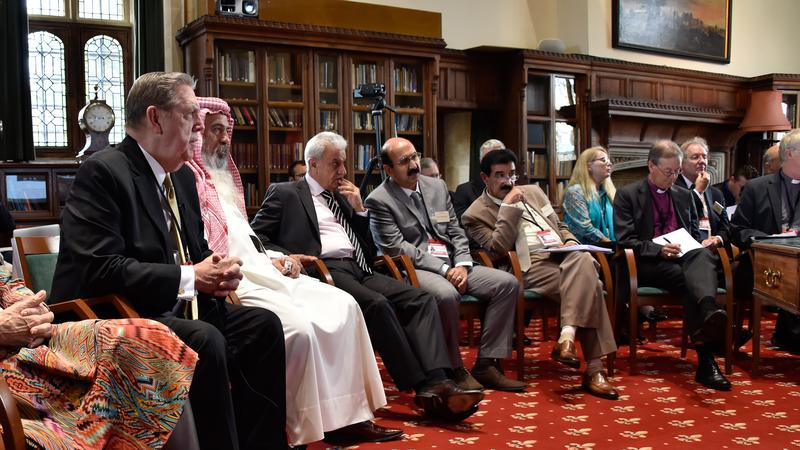Speaking at Windsor Castle to a conference on religious persecution and forced migration, Elder Jeffrey R. Holland, an apostle in The Church of Jesus Christ of Latter-day Saints, said there is much to learn from the 19th-century Latter-day Saint refugee experience that could help modern-day refugees rise above their circumstances.
“I do not pretend my people’s experiences are the same as we see happening today,” Elder Holland said. “However, all refugees share some common denominators of grief and suffering.”
Elder Holland was invited to speak on the subject by Baroness Emma Nicholson, a member of the UK House of Lords and founder and chair of the AMAR Foundation, which sponsored the conference.
“I’ve been looking around for success stories, and the Mormons are the best success story of the lot,” Baroness Nicholson said. “The Mormon story contains so many possibilities inside it that we have to dig out, explore, and see how we can replicate or copy or somehow change a little bit to a local situation.”
Latter-day Saints, Elder Holland told the conference, had hit “rock bottom” in 1838 when the governor of Missouri issued an extermination order against them and they fled to Illinois and then later to the western United States for refuge.
“The picture of Latter-day Saints today is strikingly different than their circumstances in the 19th century,” Elder Holland said. “The world now knows us as well-integrated citizens who are often titans of industry, scholars in academia, and leaders in our communities, with a Latter-day Saint being nominated by his party in 2012 for the office of president of the United States of America.”
Key to early Latter-day Saints navigating their refugee experience was their unique religious identity and their faith in God, Elder Holland said. “Whenever possible, we should facilitate and perpetuate the unique identities of refugees and highlight stories from their past. My people’s identity and faith carried them through decades of crisis,” Elder Holland explained.
| Temple Square is always beautiful in the springtime. Gardeners work to prepare the ground for General Conference. © 2012 Intellectual Reserve, Inc. All rights reserved. | 1 / 2 |
Speaking of that identity, Baroness Nicholson said in an interview, “You’ve got to be you, as well as part of the crowd. And that’s what you’ve done in Mormonism.”
Additionally, the centralized nature of the Church’s administrative structure allowed members to remain informed, united and engaged in the problems they faced — “a fact that is still true today,” Elder Holland said. He suggested that at the same time we are giving more help, “we need to give refugees greater organizational participation in shaping their own post-dislocation destiny when and where we can.”
Nineteenth-century Latter-day Saints were given assistance and refuge by their neighbors, particularly in the case of Quincy, Illinois, a community of only 1,500 people that took in 5,000 Latter-day Saint refugees. “We need to encourage local citizens to welcome [refugees] into their everyday lives,” Elder Holland said. “The LDS Church to this day recognizes the heroic contributions of the people of Quincy.”
“There was an openness to receiving help from others,” said Dr. Alastair Redfern Lord Bishop of Derby, who chaired the session. “It seems that all religions need that balance. I think we can learn a lot from them, and I hope people will study them and look at them carefully.”
During their time as refugees, early Latter-day Saints also went to great lengths to seek help from government bodies. “In some ways they were relieved, but on a grand scale, the U.S. and state government bodies failed them,” Elder Holland offered. “Similarly, governments today are not responding to the refugee problem urgently enough, nor on a large enough scale. Unless matters change, the refugees will be left to their own devices just as the Mormon migrants were.”
Members of The Church of Jesus Christ of Latter-day Saints have been encouraged to provide assistance to refugees around the world. In October 2015, the First Presidency, the highest governing body of the Church, issued a letter to all Church members encouraging them to provide assistance.
Earlier in the week, Elder Holland spoke to the conference on preventing sexual violence in conflict and forced migration. The conference concludes on Wednesday, September 14.
Baroness Nicholson: SOTs 1, SOTs 2, SOTs 3, SOTs 4
Elder Holland: SOTs 1, SOTs 2, SOTs 3, SOTs 4, SOTs 5
Bishop of Derby SOTs
Rev. Ruth Scott SOTs
